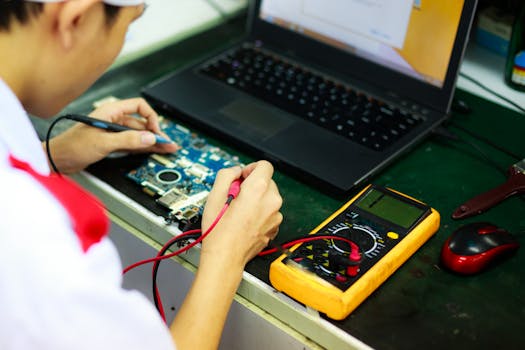
The Electric Revolution: A Journey Through the Evolution of Electronics
The modern world, brimming with technological marvels, stands as a testament to the evolution of electronics. From the humble beginnings of the telegraph to the sophisticated AI systems of today, the journey has been one of relentless innovation, driven by human ingenuity and the pursuit of a more connected, convenient, and efficient world. This article delves into the fascinating history of electronics, exploring its key milestones, pivotal inventions, and the enduring impact it continues to have on our lives.
The Dawn of the Electric Age:
The seeds of the electronic revolution were sown in the 18th and 19th centuries, with groundbreaking discoveries in electricity and magnetism. Benjamin Franklin's famous kite experiment in 1752 established the connection between lightning and electricity, paving the way for further exploration. Alessandro Volta's invention of the battery in 1800 provided a reliable source of electrical power, setting the stage for practical applications.
The 19th century witnessed a surge in the development of electrical technologies. Michael Faraday's discovery of electromagnetic induction in 1831 laid the foundation for electric generators and motors, revolutionizing power generation and industrial processes. Samuel Morse's invention of the telegraph in 1837 ushered in the era of instantaneous communication, forever altering the fabric of human interaction.
The Rise of the Vacuum Tube:
The early 20th century marked a turning point in electronics, characterized by the invention of the vacuum tube. Developed in 1904 by John Ambrose Fleming, this revolutionary device, also known as the diode, enabled the controlled flow of electrons in a vacuum, opening up new possibilities for amplification and signal processing.
The invention of the triode, a three-electrode vacuum tube, by Lee De Forest in 1906 further propelled the development of electronics. It allowed for the amplification of weak signals, leading to the creation of the first practical radio transmitters and receivers. Vacuum tubes became the core components of early radios, televisions, and computers, laying the groundwork for the electronic age.
The Transistor Revolution:
The invention of the transistor in 1947 by William Shockley, John Bardeen, and Walter Brattain at Bell Labs marked a watershed moment in electronics. Transistors, significantly smaller and more efficient than vacuum tubes, revolutionized the electronics industry. They enabled the development of smaller, lighter, and more reliable electronic devices, paving the way for the miniaturization of electronics.
The transistor's ability to amplify signals and switch electrical circuits made it ideal for a wide range of applications, including computers, radios, and televisions. It also paved the way for the development of integrated circuits (ICs), which further revolutionized electronics by integrating multiple transistors and other electronic components on a single silicon chip.
The Integrated Circuit Era:
The invention of the integrated circuit (IC), often referred to as the "microchip," in 1958 by Jack Kilby at Texas Instruments and Robert Noyce at Fairchild Semiconductor marked another pivotal milestone. The IC revolutionized electronics by allowing for the miniaturization and mass production of complex electronic circuits.
The IC's ability to integrate multiple components on a single chip led to a dramatic reduction in size, cost, and power consumption of electronic devices. It paved the way for the development of personal computers, smartphones, and other advanced electronic gadgets that have transformed our lives.
The Digital Age:
The digital age emerged in the late 20th century, fueled by the rapid advancement of computer technology. The development of microprocessors in the 1970s, led by pioneers like Intel and Motorola, brought about the era of personal computing.
The personal computer, initially a bulky machine for specialized tasks, quickly evolved into a ubiquitous device, transforming our daily lives. It became a tool for communication, education, entertainment, and business, revolutionizing information access and communication.
The Rise of the Internet and the Digital Revolution:
The invention of the internet in the 1960s, initially developed as a military communication network, laid the groundwork for the digital revolution. The internet's ability to connect computers worldwide fostered a new era of global communication, information sharing, and collaboration.
The emergence of the World Wide Web in the 1990s, led by Tim Berners-Lee, further transformed the internet, making it accessible to the general public. The web enabled the creation of a vast network of interconnected websites, providing a platform for information sharing, entertainment, and commerce.
The Mobile Revolution:
The development of mobile phones and the rise of smartphones in the late 20th and early 21st centuries revolutionized communication and information access. Mobile phones, initially bulky and expensive, quickly became indispensable tools for communication, allowing people to stay connected regardless of their location.
The smartphone, a convergence of mobile phone technology and personal computer capabilities, further transformed our lives. It became a platform for communication, entertainment, navigation, and productivity, making information readily available at our fingertips.
The Era of Artificial Intelligence and Beyond:
The 21st century has witnessed the rapid development of artificial intelligence (AI), powered by advanced algorithms and vast computing power. AI is transforming various industries, from healthcare and finance to transportation and manufacturing.
Machine learning, a subset of AI, enables computers to learn from data without explicit programming, revolutionizing fields like image recognition, natural language processing, and robotics. The advent of AI is ushering in a new era of automation, personalization, and intelligent systems, pushing the boundaries of what is possible with electronics.
The Future of Electronics:
The future of electronics holds immense possibilities, driven by the relentless pursuit of innovation. Advancements in nanotechnology, quantum computing, and 5G connectivity are expected to shape the next generation of electronic devices.
Nanotechnology, with its ability to manipulate materials at the atomic level, promises to create smaller, faster, and more efficient electronic components. Quantum computing, leveraging the principles of quantum mechanics, has the potential to solve complex problems beyond the reach of classical computers, enabling breakthroughs in areas like drug discovery and materials science.
5G connectivity, with its faster speeds and lower latency, will empower a new wave of applications, including virtual and augmented reality, autonomous vehicles, and the Internet of Things (IoT). The IoT, with its network of interconnected devices, will revolutionize industries, enabling smarter cities, homes, and factories.
The Enduring Impact of Electronics:
The impact of electronics on our lives is undeniable. From the communication tools that connect us across continents to the medical devices that save lives, electronics have transformed every aspect of our existence. It has facilitated global communication, accelerated scientific discovery, and empowered us with unprecedented levels of convenience and efficiency.
The evolution of electronics has also brought about challenges, including concerns about privacy, security, and the environmental impact of electronic waste. However, the benefits of electronics outweigh these challenges, driving innovation and improving the quality of life for billions of people.
A Final Thought:
The journey of electronics is a testament to human ingenuity and the relentless pursuit of progress. As we continue to explore the frontiers of technology, the possibilities for electronics seem limitless. The future of electronics holds the promise of a world where technology empowers us to solve global challenges, enhance human potential, and create a better future for all.



Post a Comment